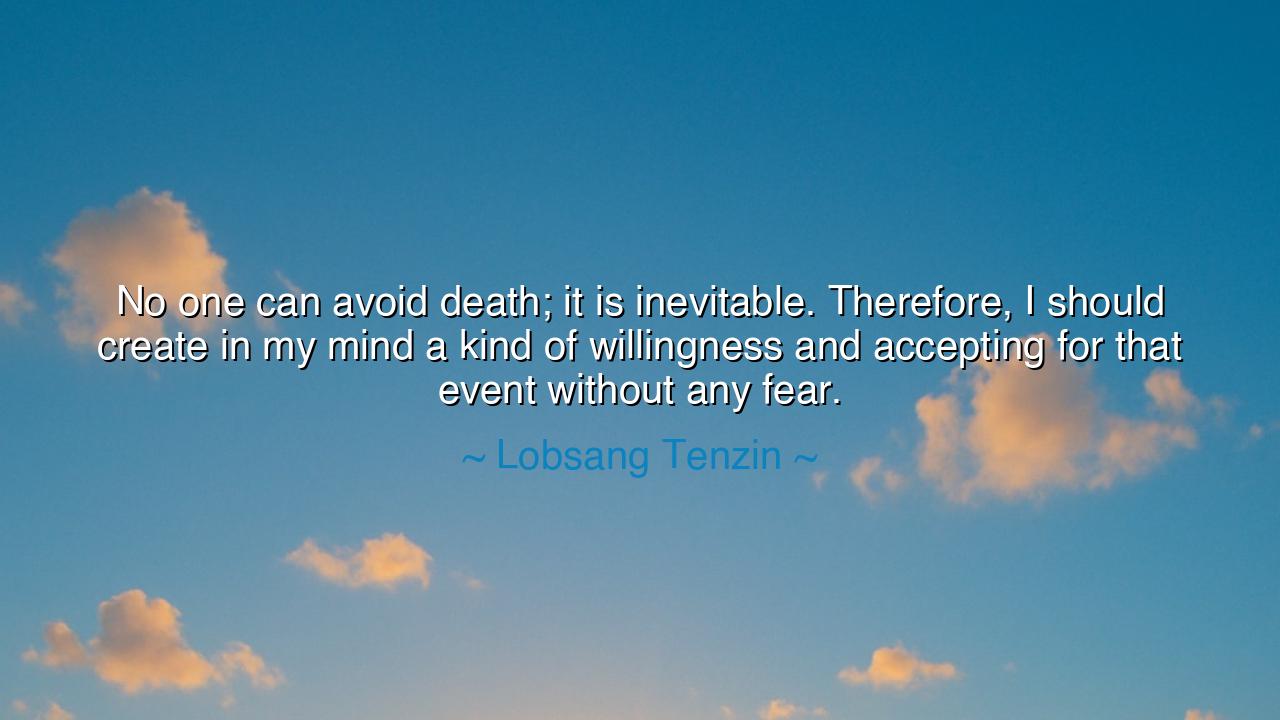
No one can avoid death; it is inevitable. Therefore, I should
No one can avoid death; it is inevitable. Therefore, I should create in my mind a kind of willingness and accepting for that event without any fear.






The words of Lobsang Tenzin — “No one can avoid death; it is inevitable. Therefore, I should create in my mind a kind of willingness and accepting for that event without any fear.” — flow with the serene wisdom of the East and the timeless courage of the human spirit. They are not the words of despair, but of liberation — a call to peace with the unchangeable, a reminder that the highest form of wisdom lies not in escaping death, but in embracing life with full awareness of its end. In these words, Tenzin, a Tibetan spiritual teacher and philosopher, speaks as one who has walked the quiet path of meditation and contemplation, who has seen that all things — body, breath, mountain, and star — move in the same eternal rhythm of birth, decay, and renewal.
The origin of this teaching lies deep within the soil of Buddhist philosophy, where death is not the final curtain, but the natural turning of the wheel of existence — the samsara, the endless cycle of becoming. To fear death, the Buddhists teach, is to fear the very fabric of reality. For death, like birth, is not a punishment, but a passage. Lobsang Tenzin, whose life was shaped by exile, meditation, and the pursuit of inner clarity, spoke these words as a guide for those still bound by anxiety. He saw that human beings, though surrounded by impermanence, struggle constantly to deny it — clinging to possessions, relationships, and even to the illusion of control. But in the moment one accepts the inevitability of death, fear begins to dissolve, and peace takes its place.
This acceptance is not surrender, but mastery. To live each day with the knowledge of mortality is to live awake — to see clearly the fleeting beauty of every breath. The ancients understood this truth. The Stoics of Greece and Rome, too, practiced the contemplation of death — what they called memento mori — not as morbidity, but as wisdom. Marcus Aurelius, emperor and philosopher, wrote: “Do not act as if you were going to live ten thousand years. Death hangs over you. While you live, while it is in your power, be good.” So too does Lobsang Tenzin remind us that death’s certainty should not breed fear, but urgency — the urgency to live rightly, to speak truthfully, to love without hesitation.
Consider the story of Siddhartha Gautama, the Buddha himself, who lived in luxury until the day he saw the Four Sights — an old man, a sick man, a corpse, and a monk. From that moment, he understood the universal law of impermanence, that all who are born must die. Yet this realization did not bring him despair; it brought enlightenment. He saw that freedom lies not in denying death, but in transcending the fear of it through understanding. So, too, Tenzin’s words echo the Buddha’s insight: that to “create in the mind a willingness” toward death is to walk the path of wisdom — to meet the inevitable not with trembling, but with a calm and open heart.
To many, such serenity may seem impossible, for the instinct to survive is ancient and fierce. Yet this is precisely why Tenzin calls upon the mind — the seat of awareness — to train itself in acceptance. Through meditation, reflection, and mindfulness, one can come to see death not as an intruder, but as an honored guest. The Tibetan Book of the Dead teaches that to prepare for death is the highest spiritual practice, for in that preparation one learns how to live. The monk who contemplates his mortality each morning is not obsessed with dying; he is awakened to life. He greets each sunrise as a miracle, each encounter as sacred, each act of kindness as eternal.
This teaching holds power not only for monks and mystics, but for all who live in a world gripped by distraction and fear. The modern mind, buried beneath noise and haste, forgets that death is not distant — it walks beside us, quietly reminding us to cherish what is near. When Lobsang Tenzin speaks of “willingness and accepting for that event,” he is teaching us to reclaim freedom from fear — to live with grace in a world that cannot be controlled. For what can truly harm a person who has made peace with death? Such a one moves through life with courage, compassion, and clarity, untouched by anxiety, unshaken by loss.
The lesson, then, is this: contemplate death, and you will discover life. Do not avert your eyes from it; instead, face it with calm acceptance. Reflect daily on the impermanence of all things — not to grow cold or indifferent, but to awaken gratitude for what you have now. Tell those you love that you love them. Spend your hours in deeds that give meaning, not in pursuits that vanish like smoke. In this way, you will fulfill Tenzin’s teaching: to meet the end without fear, because you have lived fully, honestly, and awake.
So let the wisdom of Lobsang Tenzin be the lamp that guides your days: “No one can avoid death; it is inevitable. Therefore, I should create in my mind a kind of willingness and accepting for that event without any fear.” When you no longer resist the flow of existence, you become one with it. Death will come, as it must, but it will find you not clinging, not trembling, but ready — serene as a mountain, at peace as the still water that reflects the sky.






AAdministratorAdministrator
Welcome, honored guests. Please leave a comment, we will respond soon